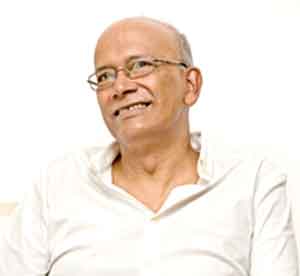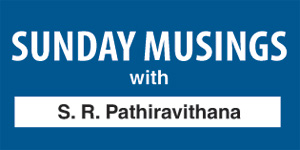How men in suits won two World Cup matches in 1996

Ana Punchihewa is willing to make a comeback if Cricket needs support - Pic by Sameera Weerasekara
Now, what we know is that, finally, Sri Lanka rode the tide and won the World Cup, thus ushering in a brand new cricketing era. But, this is the story of how it all happened behind the scenes, and how Sri Lanka qualified for the quarterfinals without even a ball being bowled.
First, let us get to know Ana Punchihewa and how he, an avid golfer, moved from the 18th hole to the middle stump.
Punchihewa explained: “My initial involvement with cricket was with my company, Pure Beverages, where we were involved with school cricket and premier division cricket. Then, in the period 1992-93, the late minister Rupa Karunathilaka asked me if I could help him rebuild the Galle Stadium. This move ended up with me becoming the President of the Galle Cricket Club and the district.”
A bit perplexed, we asked how he moved from being just a club president to be elevated to Cricket Board President? The answer surprised me even more. Punchihewa said, “When I was President of Galle CC and the district, one fine day, Aravinda de Silva came along and invited me to join the big time in cricket. Then, the late Gamini Dissanayake was to take over as the President of the Board of Control for Cricket in Sri Lanka (BCCSL) in 1994. Aravinda asked me whether I would like to be a vice president. I simply told him that I knew very little of BCCSL politics. I mean how that machinery worked. But, I was convinced and I ended up as Vice President of the BCCSL.
“In my first term I became Vice President, along with Upali Dharmadasa. Then with the unfortunate demise of Cricket Board President Gamini Dissanayake in November, it was up to Upali Dharmadasa and me to steer the ship, till there was early elections, and I think, the elections were held early February 1995. Then, in 1995, I was elected uncontested with Harendra Dunuwille and Thilanga Sumathipala as my Vice Presidents. That year, Upali Dharmadasa did not want to contest.”
We pointed out that, it was during this time that Sri Lanka was getting ready to co-host an ICC World Cup for the first time, and we asked how he saw that as a challenge. “At that time, the ICC did not get involved with organising these activities directly. It was done through PHILCOM (an ICC sub-committee) – the organising committee headed by India’s cricket Chief Jagmohan Dalmiya. The other members were myself and Pakistan’s chief of cricket. In reality, the World Cup move was started during the time of the then BCCSL Chief, the late Tyronne Fernando. Then the final phase of the programme began when I took over as President. We were down to host four matches. We were to play Australia, the West Indies, Zimbabwe and Kenya.
“Those were difficult days with the terrorist situation in the country. Then, in January 1996, the Central Bank bomb went off. That really shook the Colombo community and also the international community. That became a big hurdle to get over. The process started from then. As soon as the bomb went off, the Australians said they did not want to come, claiming it was not safe. Then the West Indies followed suit. To the credit of Zimbabwe and Kenya, they did not say that they were not coming. Then, behind the scenes work began. Then, the late Foreign Minister Lakshman Kadirgamar and I were meeting up with the Australian High Commissioner almost every other day. Then President Chandrika Kumaranatunga also got involved and we assured them all the security we can afford. Finally, we said that we would fly them to Katunayake and airlift them into the playing venue by helicopter, the stadium would be empty, play the match and fly out of Colombo. Yet, we could not persuade the Australians and we knew the West Indies were just taking the Aussie cue. They just did not understand the Asian environment.”
“However, the Australian and the West Indian stand had to be ratified at the next ICC meeting and the modalities agreed upon. “So, there was the ICC meeting in Calcutta, about a week before the opening ceremony. We went in there on the basis that Australia and the West Indies were not going to come and Zimbabwe and Kenya were going to make it.”
“Then, Australia and the West Indies demanded two points each for the matches they refused to play. But, I pointed out that it was a walkover. We wanted them to play in Sri Lanka and they have refused and there cannot be points for a refusal to play. We pointed out that, any team refusing to play has to forfeit their points, but the opposition was arguing that it was the security situation, and we counter-argued that we gave them ample security assurances.
“The ICC head at the time, Sir Clyde Walcott, requested it should be one point each for the two countries. We still refused. I pointed out to Sir Clyde, ‘Sir, that’s not correct. This is not a tie or anything. We have won the match’. Then it went into a vote. We lost the vote by one. But, we made sure there would be a second vote the next day.”
“Then I came out of the meeting and the late Hilary Marceline, our treasurer, was with me. I told Hilary we will have to start canvassing now. At that point, there were only nine votes. Bangladesh were still not a full member. So, we went from room to room, talking to the respective presidents, other than the Australian and the West Indies. Then we came back and made the numbers, and we were still one short. In that case, they still had the option of giving them one point each. Then we spoke to Sir Clyde and told him we had a problem. Personally, off the record, Sir Clyde sympathised with our plight. So, we requested that the re-vote should be held as the first item on the agenda, and so it was. Then, in the morning, when the proceedings got under way, I requested that the vote be taken. But, still there was one member short, and it was the member from New Zealand, the last hurdle that we could not clear. So, then and there we took the second vote and won by one vote. Then New Zealand pointed out they were only five minutes late, but Sir Clyde said the meeting began on time and the vote was taken. So, that’s how we started off the World Cup.
“The episode did not end there. Once they came out of the meeting, the Kenyan delegate walked up to me and said they were afraid to become the first team to play in Sri Lanka. Originally, it was Australia down to play in Sri Lanka first. The Kenyan delegate said their players were scared. Punchihewa, at that point thought, if Kenya pulls out, Zimbabwe also may try to pull out. Which means Sri Lanka will be left with no matches of the ICC’s first round in Sri Lanka. “Then I met up with Dalmiya of India and Pakistan cricket Chief Ariff Abbasi to discuss the new development at hand. I said, ‘could we go up to the room and discuss it?’. Then, while discussing, I think it was me who thought of the idea, to play one match. A joint India-Pakistan XI flying in the same day, play the match at Kettarama and fly back. Both of them agreed. Though India and Pakistan have played against each other on a few occasions, this would be the only occasion they would take the field as one team.”
 Punchihewa explained that, this was followed by other logistical issues. It was only five days before the opening ceremony of the ICC World Cup 1996, and this game was going to be a day-game. But, by then, the Kettarama Stadium sight-screen had already been painted black, ready for the World Cup matches. “Then the next problem was in what colour would this joint team be dressed in? Then it was decided that, as it is going to be a day-game, they would wear white and the match will be played with a red ball. Then I had to get my guys back home to get the sight-screen painted white, with hardly any time left, we had only two days to play the match. So, we all jumped a plane, played the match and flew back. So, that’s how we took our first steps to win the cricket World Cup”.
Punchihewa explained that, this was followed by other logistical issues. It was only five days before the opening ceremony of the ICC World Cup 1996, and this game was going to be a day-game. But, by then, the Kettarama Stadium sight-screen had already been painted black, ready for the World Cup matches. “Then the next problem was in what colour would this joint team be dressed in? Then it was decided that, as it is going to be a day-game, they would wear white and the match will be played with a red ball. Then I had to get my guys back home to get the sight-screen painted white, with hardly any time left, we had only two days to play the match. So, we all jumped a plane, played the match and flew back. So, that’s how we took our first steps to win the cricket World Cup”.
When we asked him as to why he has distanced himself from the game of cricket, he said, “At one of the ex-co meetings I said, “If we work for cricket, we won’t be seated here at the next AGM, and that is exactly what happened. A few days after we won, I was voted out of office. Since then, I have gone back to my first love – golf. But, any day, if the situation is conducive and, if there is an invitation, I might think of a second coming,” Punchihewa said in conclusion.
Is it an irony that we Lankans had the opportunity of reciprocating Pakistan’s gesture by playing a T-20 in-and-out match at Lahore twenty-two years later.


